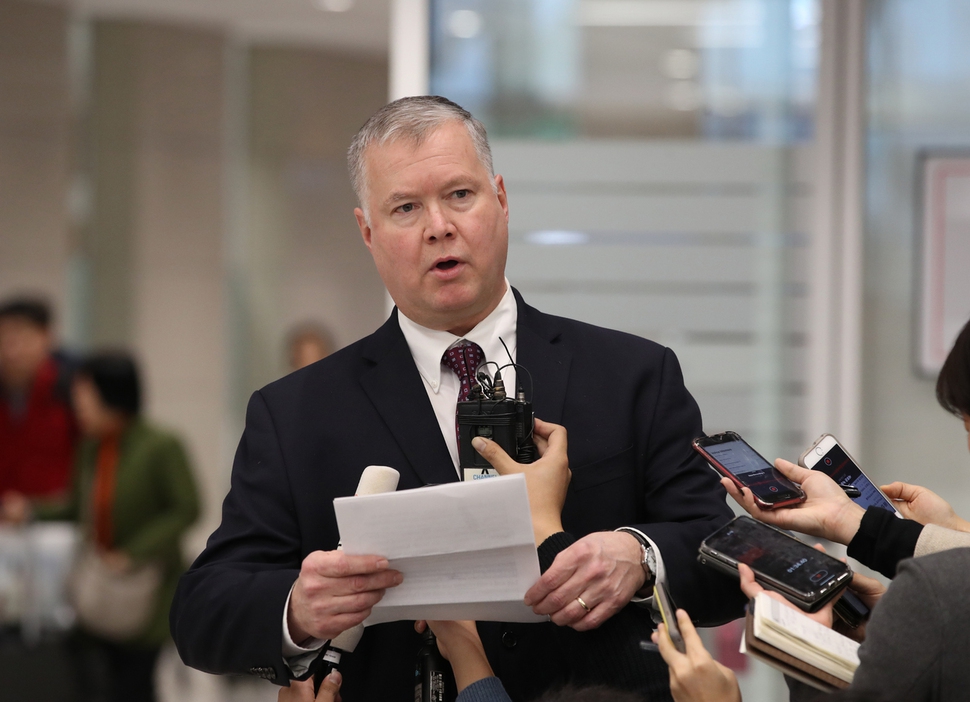 |
|
Stephen Biegun, the US State Department’s special representative for North Korea, talks to reporters after arriving at Incheon International Airport on Dec. 19. (Yonhap News)
|
Move appears to be designed to draw North Korean back to negotiation table
The US has announced that it will reconsider its ban on travel to North Korea for US citizens involved in humanitarian aid and suggested that it will allow humanitarian aid to North Korea in the New Year. The big question is whether this will break through the deadlock in the North Korea-US negotiations and pave the way to their second summit. “Upon my return to Washington, DC, next week, I have been directed by Secretary of State Pompeo to review United States policy on humanitarian assistance provided to the DPRK [North Korea] by private and religious American organizations. I will be sitting down with American [humanitarian] aid groups early in the New Year to discuss how we can better ensure the delivery of appropriate assistance [to the North],” said Stephen Biegun, the US State Department’s special representative for North Korea, to reporters at Incheon International Airport after arriving in South Korea on Dec. 19. Biegun also addressed concerns raised by humanitarian aid groups that the strict sanctions on North Korea were delaying assistance. “We will also review American citizen travel to the DPRK for purposes of facilitating the delivery of aid and ensuring that monitoring in line with international standards can occur,” he said. The death of US university student Otto Warmbier shortly after being released from detention and repatriated by North Korea prompted the US government to ban travel to the North by US citizens in September 2017. During the recent tightening of sanctions and pressure on the North, the Trump administration has reportedly even blocked humanitarian aid workers from visiting. In fact, the US rules about sanctions on North Korea don’t explicitly block humanitarian aid to North Korea. The US Treasury Department’s Office of Foreign Assets Control has rules for regular permits that cover the provision of services, such as food, in connection with the activities of humanitarian aid NGOs. But the US government has been blocking the shipment of humanitarian aid supplies to North Korea by prolonging the sanctions review period. “The US’ independent sanctions cover actions that are legally permitted but not politically supported, such as humanitarian aid. This means that the US will now be giving them political support,” said Kim Gwang-gil, an attorney. The US message appears to be designed to draw North Korea back to the table for negotiations, which have been stalled over the two sides’ failure to reach a compromise about denuclearization and corresponding measures. “The fact that the US is considering confidence-building measures, regardless of their substance, sends a positive message. It’s also important that the US hinted that it will selectively allow some travel to North Korea,” said Kim Yeon-cheol, director of the Korea Institute for National Unification. This indicates that the US might carry out a flexible, if basic, review of sanctions on North Korea, Kim said. Allowing humanitarian aid is low-key conciliatory gesture, not step toward lifting sanctions Even so, this is not a step toward lifting UN sanctions on North Korea, as Pyongyang has requested. Instead, it’s regarded as a low-key conciliatory gesture that the US is able to take without undermining its basic stance of “maintaining sanctions until denuclearization.” There’s no telling whether North Korea will respond favorably to the American gesture. While agreeing that the US’ message is a positive one, multiple experts were uncertain about whether it was substantial enough to bring North Korea to the negotiating table. “Since North Korea regards the sanctions as an expression of a hostile policy, they aren’t likely to take action unless this includes significant measures toward easing sanctions,” predicted Paik Hak-soon, president of the Sejong Institute. “The US has put the ball in North Korea’s court by proposing that the North engage in high-level talks to discuss additional denuclearization measures by the North and corresponding measures by the US,” said Cho Sung-ryul, senior research fellow for the Institute for National Security Strategy. Questionable significance of Beigun’s announcement Some analysts cautioned against placing too much weight on Biegun’s announcement, which they characterized as a “reaction to domestic politics.” According to this view, the announcement was largely aimed at mollifying the strong dissatisfaction inside the US against the Trump administration for shutting off humanitarian aid to the North. “It’s hard to regard this as a voluntary measure or gesture [by the US] in connection with negotiations with North Korea. Empty gestures to the North aren’t likely to lead to progress,” one diplomatic source said. South Korea’s Ministry of Foreign Affairs, which has been worried about the fate of North Korea-US deliberations, regards Biegun’s message as “an extremely good sign” and predicted that “North Korea would definitely take this as a signal.” The critical question in the North Korea-US deliberations, said Koo Kab-woo, professor at the University of North Korean Studies, is “whether sanctions on North Korea can be suspended or waived for inter-Korean relations.” Biegun will be staying in South Korea through Dec. 22, during which time he will be attending a meeting of the working group with Lee Do-hoon, South Korea’s special representative for Korean Peninsula peace and security affairs. By Kim Ji-eun and Park Min-hee, staff reporters and Lee Je-hun, senior staff writer Please direct comments or questions to [english@hani.co.kr]






